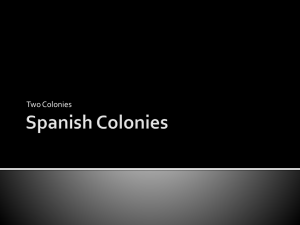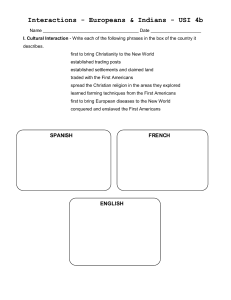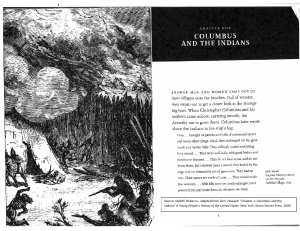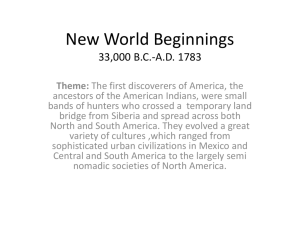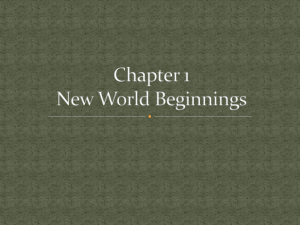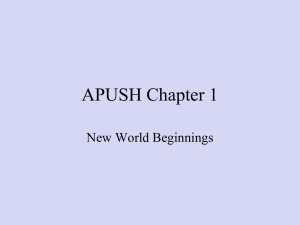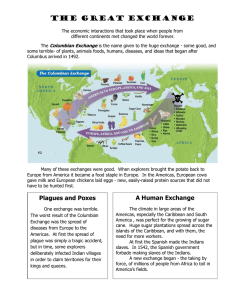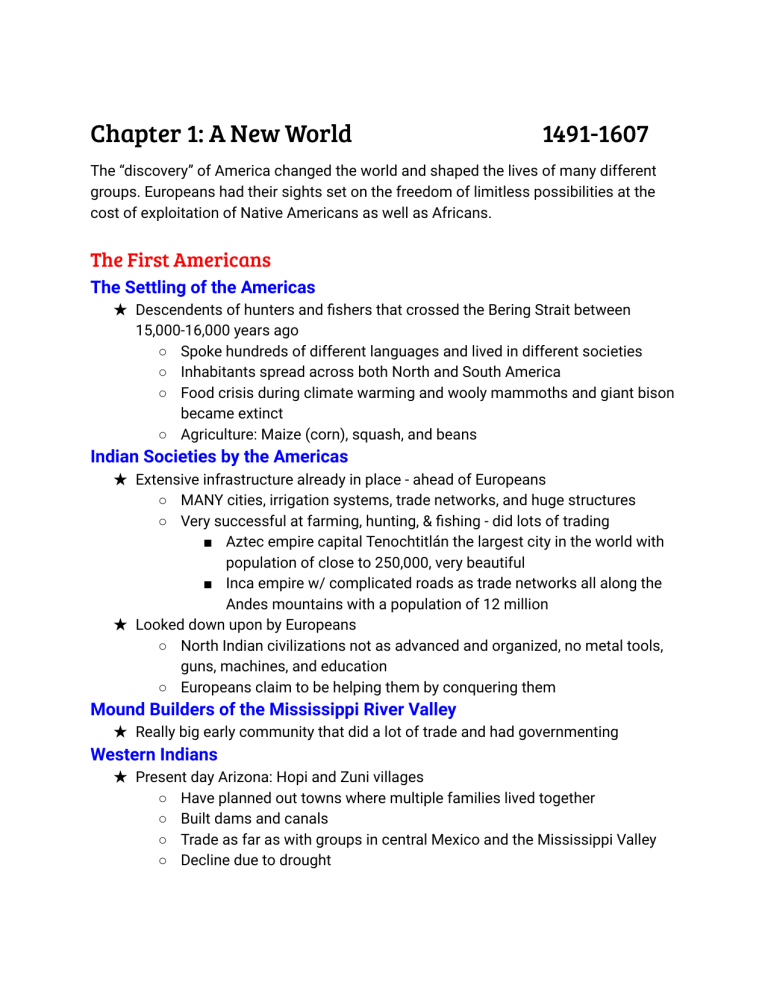
Chapter 1: A New World 1491-1607 The “discovery” of America changed the world and shaped the lives of many different groups. Europeans had their sights set on the freedom of limitless possibilities at the cost of exploitation of Native Americans as well as Africans. The First Americans The Settling of the Americas ★ Descendents of hunters and fishers that crossed the Bering Strait between 15,000-16,000 years ago ○ Spoke hundreds of different languages and lived in different societies ○ Inhabitants spread across both North and South America ○ Food crisis during climate warming and wooly mammoths and giant bison became extinct ○ Agriculture: Maize (corn), squash, and beans Indian Societies by the Americas ★ Extensive infrastructure already in place - ahead of Europeans ○ MANY cities, irrigation systems, trade networks, and huge structures ○ Very successful at farming, hunting, & fishing - did lots of trading ■ Aztec empire capital Tenochtitlán the largest city in the world with population of close to 250,000, very beautiful ■ Inca empire w/ complicated roads as trade networks all along the Andes mountains with a population of 12 million ★ Looked down upon by Europeans ○ North Indian civilizations not as advanced and organized, no metal tools, guns, machines, and education ○ Europeans claim to be helping them by conquering them Mound Builders of the Mississippi River Valley ★ Really big early community that did a lot of trade and had governmenting Western Indians ★ Present day Arizona: Hopi and Zuni villages ○ Have planned out towns where multiple families lived together ○ Built dams and canals ○ Trade as far as with groups in central Mexico and the Mississippi Valley ○ Decline due to drought ■ Become the Pueblo Indians, do desert farming and live in small villages ★ Pacific also populated by Indians, live off of fishing (LOTS of salmon in the Columbia River), hunting, and gathering while some had a farming culture Indians of Eastern North America ★ Hundreds of tribes in villages from Gulf of Mexico to Canada ○ Use a mix of farming as well as fishing and deer hunting and turkey ○ Lots of wars but were also diplomatic, had central authority for a while but was later localized from league effort ■ Alliances between the Choctaw, Cherokee, & Chickasaw ■ Great League of Peace brings security to the Mohawk, Oneida, Cayuga, Seneca, & Onondaga ★ All tribes don’t have a central identity, part of how settlers “use” them Native American Religion ★ Similarities in religious celebrations that were linked to their lifestyle ○ Believed in spiritual powers and spirits in animals, plants, trees, water, etc. ○ Perform intricate rituals and had superstitions about supernatural powers ■ Shamons, medicine men, & religious leaders highly regarded Land and Property ★ Possessions are shared among all - they don’t care for building up wealth ○ VIllage leaders assign plots of land to families for farming and some tribes claim land for hunting but no fenced areas or real estate ■ “The Great Spirit gave it to his children to live upon, and cultivate as far as necessary for their subsistence; and so long as they occupy and cultivate it, they have a right to the soil” ★ Social order very important and fixed ○ Little extreme inequalities while rulers experience less wealth than European rulers Gender Relations ★ Woman have more rights than in Europe although family is still very important ○ Allowed to have premarital sexual relations and can even divorce their husbands ○ Most groups matrilineal- clans based on mother’s family ○ Woman involved in religious ceremonies and elders can even pick village leaders ○ Owned dwellings and tools, responsible for agriculture while men hunted European Views of the Indians ★ Initially, two opinions: gentle and beautiful vs. malicious and uncivil ○ Negative view wins out due to their religion, the way they use their land, and gender responsibilities and rights differences ★ Europeans ignore what is already there, say is free for them to take and justify themselves with arguments ○ Say that Indian men is weak and women shouldnt be working in fields: by taking over, Europeans believed they were helping them find freedom Indian Freedom, European Freedom Indian Freedom ★ Natives criticized of either not knowing what freedom is or having too much of it ■ Supposedly don’t have words in language that represent freedom ★ While they didn’t have property, they disliked slavery and thought for themselves ○ Kin ties very important to individual, the wellbeing of the whole community prioritized over an individual but their individual spiritual values were very important too Christian Liberty ★ Various different views/ideas since ancient Greece, however it is not shared by all- freedom in spirit is one idea ○ Leave life of sin and receive Christ ○ Can’t separate from other aspects of life, no ideas of freedom to decide what you believe in at this time Freedom and Authority ★ Big hierarchy that could not be challenged because it was tied to God-given authority ○ Emphasis on obeying laws and submission, as well as in households Liberty and Liberties ★ Get liberty from knowing your place and doing what you should without questioning, is a certain privilege granted to you but really was given to a feweverything else was controlled by government and it frequently suppressed criticism or anything they disliked The Expansion of Europe Chinese and Portuguese Navigation ★ Inspired by want to get rid of long pathway passing through the Silk Road ○ Technological and navigational advancements for exploration ■ Chinese Admiral Zheng He naval voyages with 62 ships, larger than European nations, 225 support vessels, & +25,000 men, in 1433 lose funding (isolationism ideals), ■ Now Portugal takes the lead w/ creation of caravel (long distance travel ship) & navigation devices- want to get gold controlled by Musllim traders Portugal and West Africa ★ Portuguese continue exploring the bottom of Africa ○ Build fortified trading posts that got them LOTS of $, now other countries join in ○ Start colonization of Madeira, Azores, Canary and Cape Verde Islands ■ Make plantation and move lots of slaves in place of natives Freedom and Slavery in Africa ★ Slavery before Europeans gave slaves their own rights: they could have property and marry a free person, many gained their freedom ★ Portuguese and other traders speed up and enlarge the slave industry ○ At least 100,000 African slaves transported to Spain & Portugal 1450-1500 ○ Explorers continue: ■ 1487 Bartholomeu Dias reaches Cape of Good Hope ■ 1498 Vasco da Gama sails around india ■ Portugal has a huge trading empire with bases in India, China & Indonesia The Voyages of Columbus ★ Believed that if he sailed west he could easily reach Asia, did not know there would be land in between ★ Was inspired by economic and religious motives: wanted to convert Asians to Christianity ★ Is sponsored by King Ferdinand and Queen Isabella of Spain as well as bankers and merchants who don’t want to continue relying on Muslims for trade Contact Columbus in the New World ★ October 12, 1492 arrives in the Bahamas, probably San Salvador: left 38 men on the island and brought back 10 inhabitants to bring back to Spain and convert them ★ The next year, Columbus comes back to start colonizing the New World ★ Columbus was wrong about his route to Asia and the exploration of Amerigo Vespucci would prove that they found a new continent Exploration and Conquest ★ Invention of faster printing press by Johannes Gutenberg makes news of Columbus’ discoveries well known by the educated, many countries begin exploring too ★ Spanish take the lead looking for $, glory, and want to spread Catholicism: Conquistadores and missionaries continue traveling to the New World ★ Hernán Cortés conquers the Aztec empire with superior technology and is aided with diseases that the Aztecs are not immune to, later conqueres the Incas toomaking Spain rich! The Demographic Disaster ★ Transatlantic trade aka the Columbian Exchange- brings plants and animals that evolved separately together ○ Brought diseases to the Americas that killed millions of natives and caused huge decline of civilizations ■ Population of Americas estimated to be from 50-90 million during Columbus voyages but in 1492, there was roughly 2-5 million in what is now the United States- not caused just by diseased, also due to war, slavery, forced conversion to Christianity, and overall distruction of the Americas by Europeans The Spanish Empire Governing Spanish America ★ Authority headed by the King with people with less power underneath ○ Use the Counsel of the Indies and local officials called viceroys ○ The Catholic Church intervened a lot w/ the Indians for religion, morals, and treatment of them ○ Royal officials appointed- don’t let creoles have positions of power for sake of loyalty to the king ■ Later on, local wealthy play more of a role Colonists in Spanish America ★ Rely on forced labor of Indians rather than importing slaves ★ Settle the land, first to come mainly men who oversee forced labor, later families Colonists and Indians ★ Indians far larger population than the top peninsulares class ○ Allowed certain rights and even wanted assimilation of the Natives w/ society ○ Mixing of Native women and Spanish men due to lack of Spanish women ○ Mestizos = persons of mixed heritage and culture Justifications for Conquest ★ Belief of superiority- better than the natives ★ Burden to convert to Catholicism, rights given by the pope Spreading the Faith ★ Main goal was to spread Catholicism to Indians to become obedient subjects ○ Redoubling of efforts to spread the “true faith” after Martin Luther’s 95 Theses against the church (Protestant church now gaining support in Europe) ○ Spanish settlers feel that it is okay for them to exploit Indians while converting them La Casas’s Complaint ★ 1537 Pope Paul III outlaws enslavery of Indians ★ Bartolomé de Las Casas advocates against Indian abuses Reforming the Empire ★ Change starting to happen thanks to Las Casas: 1542 New Laws ○ No more encomienda system, now repartimiento where Indians are free and have wages- however, still labor and get abuses ○ Disagreement between colonists, missionaries, & other authorities over control of Indian labor ★ Over time, conditions improving, but Black Legend is created- that Spain is brutal colonizer- and other countries use to justify themselves Exploring North America ★ Spain creates colony Puerto Rico in 1508- first in the US! ○ Looking for wealth, slaves, and fountain of eternal youth ★ Exploration causes lots of damage from torture, rape, enslavement, & disease: No one left in the 17th century Spanish Florida ★ Exploration allows Spanish to claim territory in these areas ○ Establish military bases ■ Want to fight pirates ■ Remove/discourage the French ★ Wasn’t that successful Spain in the Southwest ★ Pretty neglected by the Spanish because of the lack of gold and environment ○ 1598 Juan de Oñate leads a group to build settlement, destroys Indian sky village of Acoma The Pueblo Revolt ★ Indians discontent with the Spanish ○ Work together against common enemy (ironically, speak spanish as shared language)- becomes the only successful complete removal of settlers by natives ■ organized by Popé, a religious leader The French and Dutch Empires French Colonization ★ Rivals of the Spanish, inspired for gold and believe they better than Spain ○ Starts unsuccessful, not that many visitors until 17th century ■ French take control of the Mississippi River ★ Ruled by a governor-general ○ Most of population (80%) is men, very small population New France and the Indians ★ Fur trade! Much better treatment of natives since mostly economic, are more accepting and engage in military and diplomatic relations ○ Although more positive, still change and wars and deaths caused ○ Métis (mix children) act as guides, traders, & interpreters The Dutch Empire ★ 1609 Henry Hudson sails along Hudson River looking for way to Asia ○ Finds fur and natives willing to trade ○ This sets them up to become New York City Dutch Freedom ★ Freedom of press and freedom of religion ○ Because of these freedoms, had many immigrants that would help to populate the oversea empire Freedom in New Netherland ★ Governed by individuals of the West India Company, no set governing however colonists have lots of freedom, especially in religion- even slaves and woman have more too The Dutch and Religious Toleration ★ Extremely diverse- at least 18 languages in New Amsterdam, although tolerant of differences, still had some limits (could not worship publicly) Settling New Netherland ★ Promised freedom of religion, cheap livestock, and free land after 6 years of labor ★ Patroons- shareholders responsible to move tenants and in return given land ★ While Netherlands sent 1 million ppl to their overseas colonies, was still small New Netherland and the Indians ★ Did not want to treat Indians like Spain since they just gained independence too ○ Recognize that natives own the land, have to purchase ○ Build trade and diplomatic relationships, treat them as equals Borderlands and Empire in Early America ★ Places where the cultures and geographies are not clear= an overlap ○ Caused a mixing of cultures ○ Lots of fighting going on for authority ○ Traders went in between ★ Regardless of country fighting for superiority, all colonizers had similarities: ○ Christianity ○ Technology & learning ○ Legal systems ○ Intermixing of cultures ○ New ways of gaining wealth ○ War and disease ○ Hopes for freedom
